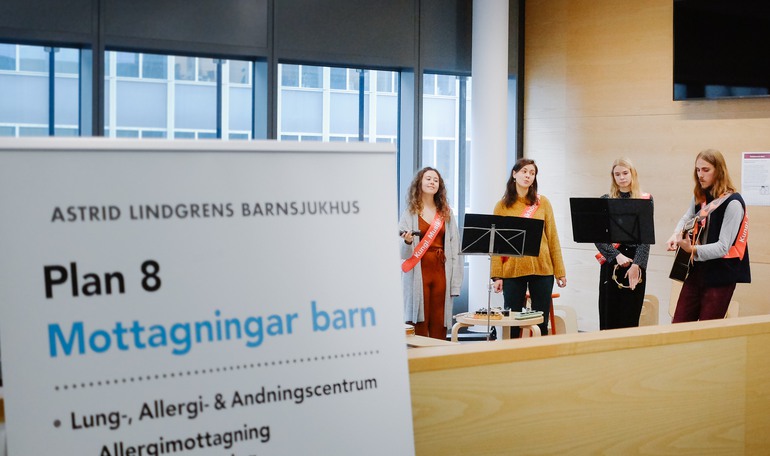
Music therapy
The bachelor's program in music therapy is unique in Sweden. The education gives you deep knowledge of the relationship between music as an art form and people's health and well-being. As a music therapist, you work in medicine, healthcare, social care, school and cultural life.
At KMH, we have Sweden's only bachelor's programme in music therapy. Our environment for research and teaching offers inspiration and knowledge and attracts the best teachers.
Please note that Swedish is required for this programme.
As a music therapist
After completing the education, you can use music and musicianship to promote health and as a therapeutic tool. You work with well-being for the whole person and spread knowledge about how music promotes health. Clients you may meet include, for example:
- children with disabilities
- adults with depression, trauma or anxiety
- people with Parkinson's disease or dementia.
Music therapy is an established form of therapy based on extensive research. The labour market is national and international and exists in both the private and public sectors.
Requirements
Please note that a knowledge of Swedish is a general entry requirement.
In addition to basic eligibility for university studies, passed entrance exams in music therapy are required. You get admitted based on the exam.
About the programme
The programme includes elements in music and health, music therapy as a field of knowledge and profession, musical learning and music. Theoretical and practical knowledge allows you to work with music therapy in different areas.
During education, you meet representatives of your future professional life. You will also come into contact with prominent researchers in different fields.
Music and health
Music and health characterizes the entire education. This interdisciplinary field spans music as an artistic activity, pedagogy, psychology, sociology, philosophy and medicine.
Music therapy
The education includes courses in music therapy methods and techniques that you will explore and try in musical forms. You can develop your music therapy skills during the acting, singing and ensemble courses and arranging and composition. An essential element in music therapy work is improvisation, which is therefore given clear space in this education.
The essence of music therapy competence is the ability to listen and understand, and to play with meaning.
Tony Wigram
VFU, supervised work placement
Theoretical courses alternate with practical elements during education. With VFU, you test and explore your new theoretical knowledge at the workplace. You get to meet children, young people, adults and the elderly in several different contexts, all the time with the support of your supervisor.
Thesis and research methods
The final year includes a course on how research methodically is done, while you do your independent work. Then you will already be confident in your writing, thanks to previous years' preparatory courses.
If you have any questions about validation of prior learning, please contact associate professor Ann-Sofie Paulander, ann-sofie.paulander@kmh.se.
After the studies
There is an increased demand for music therapists in many areas, such as child healthcare and elderly care. Education opens up opportunities for work in medicine, healthcare, social care, school and cultural life. Many music therapists choose to start their own companies and conduct independent activities in both the private and public sectors.
The program also entitles you to advanced scientific studies at an advanced level.
Sweden's academic music therapists
As a student, you can become a member of the association Sweden's Academic Music Therapists, SAM. When you have your degree, you can apply for registration in SAM and receive support in your work through the association. SAM's network opens up international contacts, conferences and further education.
